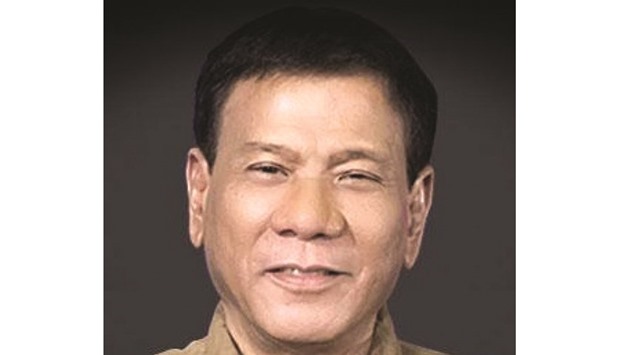President Rodrigo Duterte warned the Philippines’ top judge yesterday to let him pursue a deadly anti-crime campaign that has left hundreds of suspects dead, suggesting otherwise he would impose “martial law”.
Supreme Court chief justice Lourdes Sereno criticised Monday Duterte’s public shaming of seven lower court judges for alleged involvement in the narcotics trade, adding that one of the judges was murdered eight years ago.
“Go ahead and try to stop me. Would you rather that I declared martial law?” Duterte said in a speech to soldiers during a visit to a military camp in the southern Philippines.
“Let’s not kid each other ma’am, and do not force the issue,” Duterte warned Sereno.
“You do not warn me. I warn you. I can order everyone in the executive department not to honour you,” he added.
“Please do not create a confrontation, a constitutional war. We will all lose,” the president added.
Sereno had told Duterte in a letter that it was her sole responsibility to impose punishment on judicial “misfits”, and that publicly naming them, even without charges filed against them, had put their lives in danger.
“To safeguard the role of the judges as the protector of constitutional rights, I would caution them very strongly against ‘surrendering’ or making themselves physically accountable to any police officer in the absence of any warrant of arrest,” she added.
Meanwhile, The Philippines’ Supreme Court yesterday ordered an inquiry into four judges who President Duterte linked to the drug trade, a day after the chief justice criticised the president’s name-and-shame campaign in his war on narcotics.
Supreme Court spokesman Theodore Te said the court asked a retired judge to conduct a fact-finding investigation into “the alleged involvement of four incumbent judges”, and to present a report in 30 days.
“The court today resolved to treat the speech of President Rodrigo Duterte as a complaint against the four judges,” Te told a news conference in Manila, adding the four judges were given seven days to respond to the complaint.
“This is just for the administrative case since the Supreme Court does not have jurisdiction on criminal cases.”
Duterte, elected in a landslide in May largely on a pledge to kill tens of thousands of criminals, has previously shrugged off allegations that police were committing extrajudicial killings.
However, police have acknowledged in a new tally released yesterday killing 513 drug suspects, allegedly for resisting arrest.
Human rights groups have criticised the killings by police as hundreds of other people have been slain by shadowy anti-crime vigilantes who often leave signs on their victims’ bodies accusing them of drug trafficking.
Police have also arrested more than 7,000 drug suspects since Duterte took office.
United Nations agencies and international human rights monitors have expressed concern over the killings, and on Monday the US government, the Philippines’ main military ally, weighed in on the issue.
“We are concerned by these detentions, as well as the extra judicial killing of individuals suspected to be involved in drug activity in the Philippines,” State Department spokeswoman Elizabeth Trudeau said in Washington.
Duterte’s spokesman, Ernesto Abella, told a news briefing the president had “repeatedly expressed he does not condone extrajudicial killings” responding to a US State Department concern about the rise in drug-related killings.
Abella said the interior minister had ordered the national police chief to investigate drug-related murders, particularly those carried out by vigilantes.

u201cLet’s not kid each other ma’am, and do not force the issue, You do not warn me. I warn you. I can order everyone in the executive department not to honour youu201d
